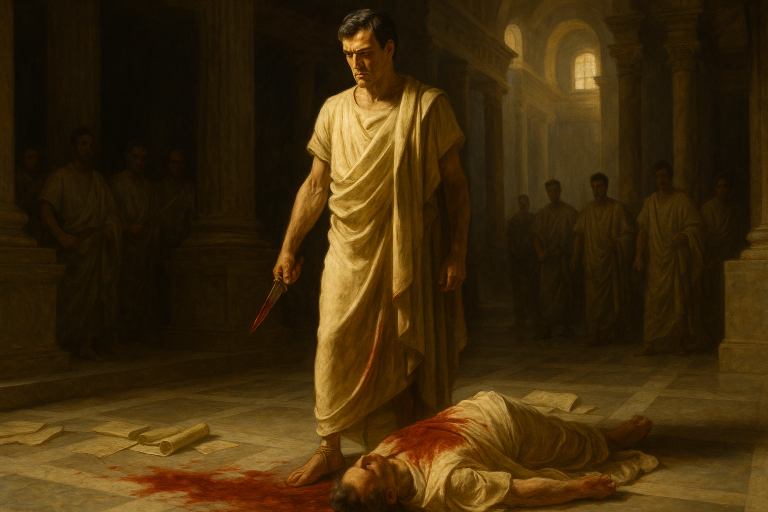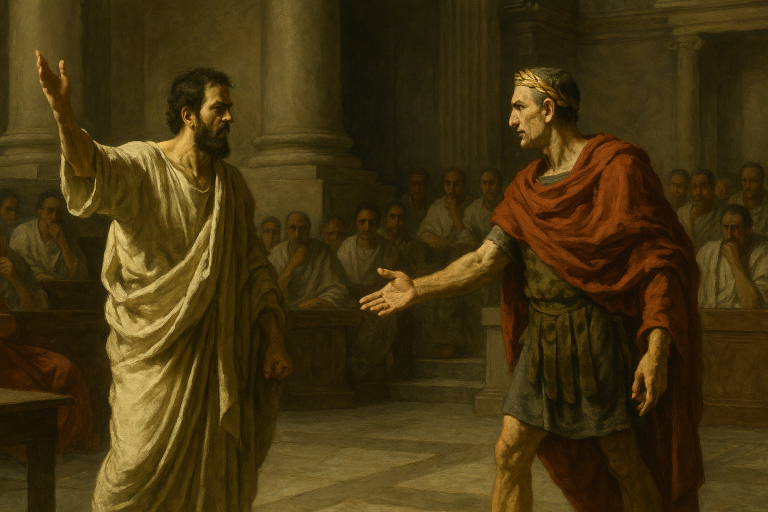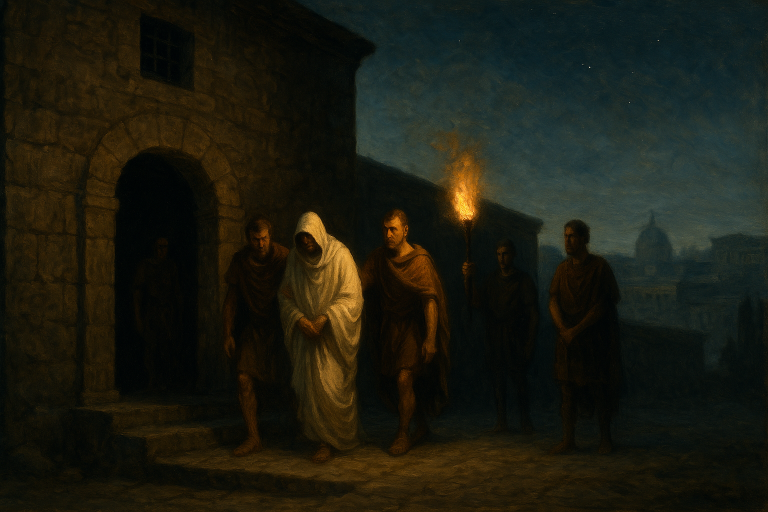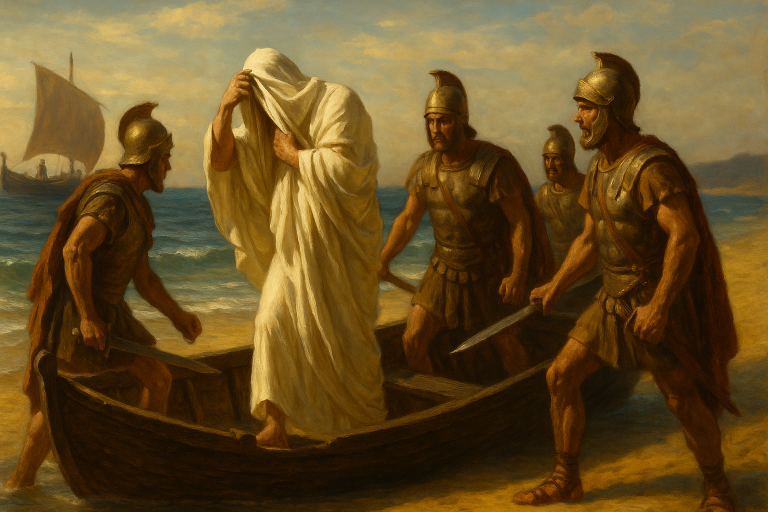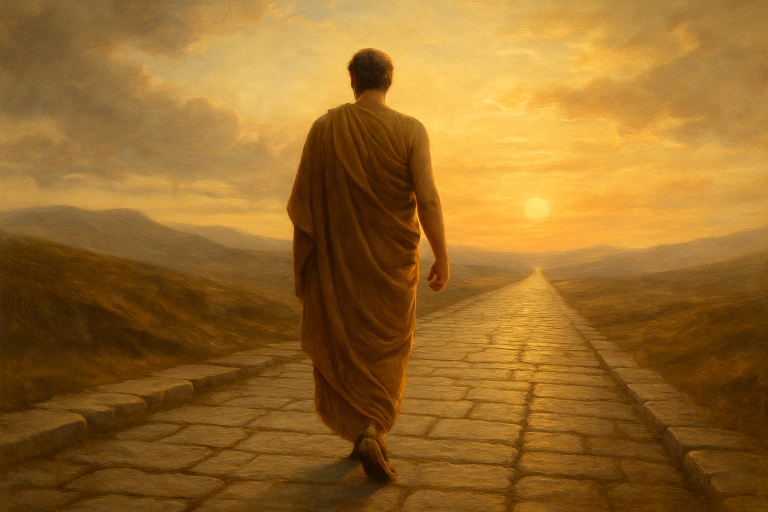Stoicism Without Christ · Can You Live Ethically Without Religion?
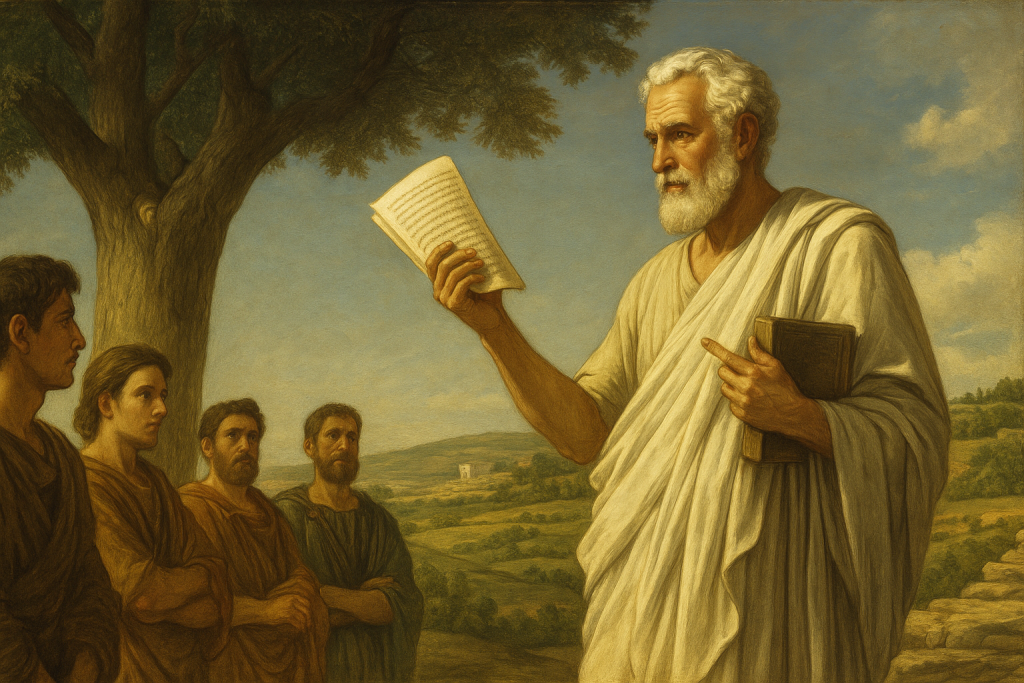
For many, morality has been tied to the religion they grew up with. The Bible, the church, the sermons. All of it presented as the foundation of right and wrong. The message was clear that without faith, life falls apart. But is that really true?
What if you want to live with responsibility and strength but you do not share Christian beliefs? Can you still hold yourself to a code of honor without religion to anchor it?
That question is not new. Long before Christianity spread, people were already searching for a way to live well, to discipline themselves, and to face chaos without losing their footing. One of the clearest answers they found was Stoicism. A philosophy that built its ethics not on revelation but on reason, practice, and daily virtue.
Stoicism stood as a complete system centuries before Christ. Leaders like Marcus Aurelius and Cato the Younger shaped their lives by it, facing war, betrayal, and political collapse without turning to religion for guidance. Their example suggests something most of us are rarely told. Morality does not have to depend on belief. It can stand on its own if you have the courage to live it.
Stoicism in History
Stoicism began in Athens around 300 BC with Zeno of Citium, but it reached its sharpest edge in Rome. By the first century it was the philosophy of statesmen, generals, and emperors. Not a niche idea hidden in lecture halls but a way of life for those who carried the weight of empire.
Cato the Younger, the fierce opponent of Julius Caesar, became known for his incorruptible character. He lived simply, refused bribes, and stood firm against tyranny, even choosing death over submission. Later generations remembered him as the embodiment of Stoic virtue.
Marcus Aurelius, called the philosopher emperor, wrote his Meditations while leading armies against invading tribes and managing constant crises at home. He leaned on Stoicism not for theory but for guidance on how to lead with fairness and restraint. His words, never meant for an audience, still read today as reminders to act with integrity, to face hardship with patience, and to keep duty above comfort.
These men did not rely on Christianity. They lived and died before it spread across the empire. Their compass was shaped by Stoicism alone. In a world marked by war, political violence, and plague, Stoicism gave them a framework strong enough to endure. It was a moral code built not on revelation but on reason, and it proved its worth in the harshest conditions imaginable.
Stoicism as a Code for Living
At the heart of Stoicism is a bold claim that virtue is the only true good. Everything else such as wealth, health, status, or even life itself is secondary. These things may be useful, but they do not decide whether a person lives well. Character does.
The Stoics defined virtue with four qualities. Wisdom is seeing reality clearly and making sound judgments. Justice is honoring obligations, treating others fairly, and putting the common good above selfish interest. Courage is the strength to face pain, loss, or danger without surrendering to fear. Temperance is the self-mastery that keeps desire and indulgence from taking control.
This framework gave us a complete system of ethics without needing belief in revelation. No promise of heaven. No threat of hell. No dependence on religious institutions. Stoicism grounded morality in reason and in the order of the natural world. If you wanted to live with integrity you did not need a priest to guide you. You needed discipline, reflection, and the daily practice of virtue.
By placing virtue at the center of life, the Stoics built a moral code that guided both emperors and ordinary people. It was universal, rational, and practical. An ethic strong enough to stand without Christ and still inspire generations long after him.
Why Stoicism Speaks to Us Today
Many feel that morality has to be anchored in religion. Yet not everyone feels at home in the pews. Some are skeptical of faith but still want order, discipline, and virtue to guide their lives. For them, Stoicism offers a framework that does not depend on belief but still calls for strength and responsibility.
Stoicism insists on personal responsibility. It teaches that while you cannot control politics, the economy, or the state of the culture, you can control your own judgment and your own actions. That message matters in a time when blame shifting and victimhood are everywhere.
Stoicism also gave us a shield against cultural drift. By rooting ethics in reason and discipline, it pushes back against the idea that right and wrong are whatever people say they are in the moment. It reminds us that certain virtues such as justice, courage, and self control never go out of style.
Stoicism makes room for virtue without sermons. It shows us a way to live with integrity that does not depend on church membership, doctrine, or divine authority. For people who want to build character but hesitate to bind themselves to a faith they do not share, Stoicism offers a path forward. A way of life that is practical, disciplined, and rooted in personal honor.
The Common Objection
A common fear is that without God, morality collapses. If there is no higher lawgiver, then right and wrong become nothing more than opinions. That idea is repeated often, and many grow up hearing that without faith, they cannot truly live an ethical life.
The Stoics answered differently. They built morality not on revelation but on reason and the order of nature. To them, virtue was not right because someone declared it from above. It was right because it fit human dignity and the structure of the world itself.
This way of living produced results that often look the same as Christian ethics. Honesty, courage, fairness, and self control stand at the heart of both. The difference is that Stoicism does not rely on scripture to make those virtues real. They are self evident to anyone willing to look closely at life.
History gives us proof. Men like Cato and Marcus Aurelius lived with discipline, honor, and public duty long before Christianity took hold. Their example shows that morality can stand firmly on reason and character, even when religion is absent.
Stoicism in Practice
The strength of Stoicism is not in abstract ideas but in daily use. It gives us practical tools for building character and facing life with steadiness. Three stand out for our time.
The first is Premeditatio Malorum, the rehearsal of setbacks. By imagining difficulties before they arrive, you take away fear and prepare your response. Picture losing your job, facing illness, or being betrayed by a friend. Instead of being crushed by surprise, you meet hardship already trained in patience and resilience.
The second is the Dichotomy of Control. Epictetus taught that some things are up to us such as our judgments, choices, and actions. Everything else lies outside our command. Most people spend their lives chasing what they cannot control such as wealth, status, or approval. Stoicism directs your energy back to the one thing you can always govern which is your own conduct.
The third is journaling. Marcus Aurelius filled his Meditations with reminders, corrections, and reflections meant only for himself. A simple notebook can do the same for you today. A few minutes of honest self examination each night will reveal where you fell short, where you stood firm, and how you might live better tomorrow.
Taken together, these practices create a manual for character. They do not require faith or ritual. They do not depend on clergy or doctrine. They ask only that you look at yourself with honesty and train your soul toward virtue.
So can you live ethically without Christ? The Stoics believed the answer was yes, and their lives proved it. They built a moral system grounded in reason and discipline, not revelation, and it shaped some of the strongest characters of the ancient world.
This does not mean Stoicism was a rival to Christianity. In many ways the two overlap. Both value honesty, courage, justice, and self control. The difference is that Stoicism shows these virtues can stand on their own, independent of divine authority. They are part of human life itself and open to anyone willing to practice them.
For people today who want strength and responsibility but do not feel tied to religious belief, Stoicism offers a way forward. It shows that morality does not collapse without faith. It can rest on the solid ground of reason, habit, and personal responsibility.
Try living as the Stoics lived. Begin with small practices. Picture setbacks before they arrive. Focus only on what you can control. Keep a record of your conduct. Do not leave the system in theory. Test it in action.
You may find, as the Romans did, that virtue does not need revelation to endure. It only needs practice and the courage to live by it.

